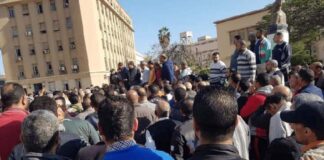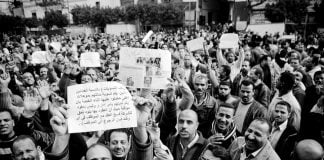After the recent election Egypt’s parliament is dominated by Islamists. But, argues Phil Marfleet, they face immense pressure from Egyptians to deliver real change and break with the military
Seventy three per cent of Egypt’s People’s Assembly, the lower house, is composed of members of the Muslim Brotherhood and the Nour Party. This suggests a stunning electoral performance by the Islamists and a tricky time ahead for revolutionary activists who do not embrace their agendas. But the picture is much more complicated.
On January 25 Egyptians marked the revolution’s first anniversary. Millions of people headed for Tahrir Square, where the Brotherhood had erected a stage and a large banner which declared, “Our presence in Tahrir is to celebrate the January 25 Revolution and declare that we support all its goals.” Brotherhood speakers congratulated the people and introduced patriotic songs.
They had badly misjudged the mood: demonstrators were not celebrating. Chanting “Freedom, justice, social equality”, they drowned out the Brotherhood, shouting that the people’s goals had not been fulfilled and that the revolution must continue.
Anger at SCAF
The scenes were replayed two days later on the first anniversary of the “Friday of Rage”, marking the day in 2011 when riot police killed hundreds of protesters. Large sections of the crowd howled down Brotherhood speakers, chanting, “Get off the stage!” They insisted that people were still in mourning, that their murderers must be brought to justice, and that struggles would continue until the end of ruling Supreme Council of the Armed Forces (SCAF).
Many demonstrators had marched on Tahrir from mosques in which the Brotherhood usually expects a sympathetic hearing. Crowds assembled after Friday prayers, shouting, “Down, down with the military regime!” and “We want civilian, not military [government]!”
This was a direct challenge to the Brotherhood, whose leaders have urged Egyptians to accept that SCAF will hand over power when they’re ready.
Millions of people don’t buy it. Since the fall of Mubarak they have seen a series of massacres perpetrated by police, army and paid gangs. SCAF has protected notorious figures of the former regime and is fighting to preserve the generals’ own authority and privilege.
There was widespread disgust when, during the first session of parliament in January, the new speaker—Brotherhood member Saad al-Katany—proposed a thank you message to SCAF. This addressed the armed forces’ leader Field Marshal Tantawi: “The People’s Assembly commends your historic stances in the great Egyptian Revolution. You have taken the side of the people and their peaceful revolution…and as brave fighters you shouldered the burden of making this choice.” Even Brotherhood MPs opposed the statement.
Leadership of the Brotherhood lies with a particularly conservative group elected in 2009 when the organisation was retreating from national politics. After decades of repression under the Mubarak regime the new leaders pulled back, intending to focus their members on religious observance and community affairs. Mubarak had, in effect, tamed the Brotherhood.
On his election as the organisation’s senior official (the murshid, or guide) Mohamed Badie declared that the Brotherhood would seek only gradual reform and would not confront Mubarak. Many members were appalled: the regime held thousands of activists in its prisons, including several of the organisation’s most esteemed elders. Badie had, in effect, surrendered publicly, distancing the Brotherhood from political movements that, for ten years, had mounted effective opposition over political reform, workers’ and students’ rights, and solidarity with Palestinians.
The Brotherhood could hardly have been more ill-prepared when the revolution began in January 2011. Its leaders first said the organisation would not participate in street protests; when the country was engulfed by demonstrations that involved thousands of Brotherhood members, they eventually relented. Soon, however, they struck a deal with SCAF: the military would prepare parliamentary elections that maximised opportunities for the Brotherhood; in exchange they would back interim military rule.
The Brotherhood got its election, and a large parliamentary majority—but at a price. SCAF has used the past year to assault the revolution on every front, alienating millions of Egyptians and opening up divisions within the Brotherhood. Youth members left to form a new organisation, the Egyptian Current Party, and two former leaders of the organisation announced that they would stand independently for president (elections are due in May). The Brotherhood contains many groups and networks, and its leaders struggle to impose their will, especially upon young members.
The Brotherhood now dominates a shadow parliament—one that has an electoral mandate but little power. Real power lies with the senior officers of SCAF who were hand-picked by Mubarak and served him for decades. The contradiction may be too much even for Badie and the Brotherhood’s leadership to contain.
The Brotherhood’s vote
Why did so many Egyptians vote for the Brotherhood? In the absence of other established parties, they were prepared to give the organisation a chance. Before it started to retreat from the political arena in 2009, the organisation spent years contesting elections and engaging in a host of welfare activities—supporting schools, clinics, hospitals and youth centres. It provided a reformist alternative to the Mubarak regime, opposed imperialist wars and (at least rhetorically) backed the Palestinian cause.
The biggest attraction for voters in the recent election, however, was the Brotherhood’s reputation for having clean hands. The scandals associated with Mubarak and his $70 billion fortune hidden in Swiss banks produced a desire for political representatives free of corruption. Egyptians have given the Brotherhood a chance—but are now watching its performance carefully.
The question of the Salafis’ electoral success is more complex. Their parties emerged publicly only after the revolution, supported by newspapers and television stations subsidised by funders in the Gulf, especially in Saudi Arabia. There are many reports of Salafi candidates buying votes, especially in the countryside, where it seems that some adopted the vote-fixing methods of Mubarak’s National Democratic Party.
Paradoxically, some candidates also echoed the radical nationalism of the Nasser era, with talk of ending poverty and reclaiming national dignity. These appeals to the poor have been combined with the more familiar demands of Islamic conservatism—prohibition of alcohol and new dress codes for women.
Secular parties made a poor showing. They were slow to start their campaigns and could not hope to build effective national organisations in just a few months. Some people who might have voted for non-religious parties boycotted the election. Many activists and sections of left led the boycott, insisting that the murderous attacks on demonstrators organised by SCAF in November meant the election could not be meaningful.
Nationally, participation rates were not high: the final official total for the first round of the elections was 48 per cent. In some areas of the country it was much lower.
Challenges ahead
The core of the Brotherhood contains businessmen committed to maintaining the stability of the Egyptian state; they are prepared to strike all manner of deals with the military. But the organisation also contains much larger numbers of middle class and poor people who have their own scores to settle with SCAF. Many joined street protests and strikes during the past year: the national teachers’ strikes of October 2011, for example, mobilised thousands of members and supporters of the Brotherhood.
The leadership is under huge pressure to deliver: to see off military rule; to bring an end to emergency laws; to free political prisoners; to prosecute members of the old regime; and to tackle growing unemployment, homelessness, poverty and hunger. Its immediate problem is the generals’ post-election present to the new government: $20 billion of budget cuts.
The Islamists enter parliament challenged to deliver an austerity budget at a time when the combined effects of world crisis and a huge reduction in foreign currency earnings (associated with the collapse in tourism during 2011) pose questions over Egypt’s capacity to buy food grains abroad and to maintain basic levels of nutrition. There is no popular mood to accept government-imposed cuts: any attack on food subsidies would be regarded as an assault on the people.
Thirty years ago Egypt was self-sufficient in food; now it is the world’s largest importer of food grains. Last year the government spent $5.5 billion subsidising wheat, sugar, rice and cooking oil for general consumption. It also subsidises butane gas used for cooking.
The International Monetary Fund (IMF) and the World Bank want big cuts. They follow the very same agendas with which Mubarak complied for years, reducing food subsidies while he seized lands from Egypt’s peasants and turned them over to private landowners who promptly abandoned cultivation of food staples in favour of cash crops for export.
Another key issue is whether the Brotherhood will end Mubarak’s craven support of Israel’s oppression of Palestinians. Will they end Egypt’s shame: the closure of borders with Gaza by means of fences and patrols that echo Israel’s apartheid wall? In January the number two official in the US State Department met Brotherhood leaders in Cairo. Deputy secretary of state Bill Burns said he was satisfied with the talks, especially the Brotherhood’s assurance that it would “uphold Egypt’s existing international obligations”—code for maintenance of relations with Israel.
Month after month the revolutionary movement has demonstrated its capacity to withstand onslaughts from SCAF and to expand new forms of organisation: activist coalitions, workplace and campus groups, independent trade unions, and neighbourhood committees. Since parliamentary elections in November there has been a further surge of strike activity, with demands over pay, bonuses and jobs. And in an important legal decision, Egypt’s appeals court recently upheld earlier decisions favouring workers who demand renationalisation of industrial companies sold off fraudulently under Mubarak.
Much international media coverage views the election results as confirmation that Egypt’s revolution is faltering, that it has taken a turn towards conservatism or has even come to an end. That is not the picture in Tahrir or in central squares across Egypt. On the contrary, the popular mood is one of increased radicalisation and of great anger.
The revolution continues, even with Egypt’s Islamic reformists in government. The question is not how long the revolution can last but how long the Islamists can maintain their credibility and their influence on a society still in the process of radical change.





